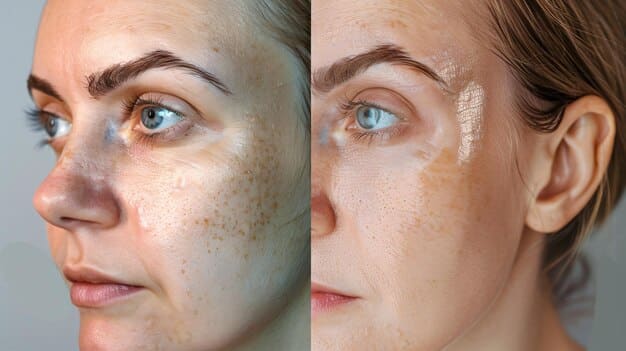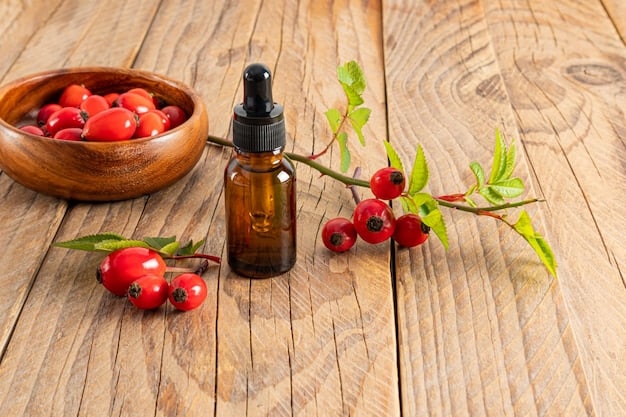Retinol Alternatives: 3 Plant-Based Options for Similar Results

Discover retinol alternatives with plant-based options that offer similar anti-aging benefits without harsh side effects; bakuchiol, rosehip oil, and sea buckthorn oil can help you achieve radiant and youthful skin in the next 6 months.
Are you seeking the rejuvenating effects of retinol but wish to avoid its often irritating side effects? The good news is that retinol alternatives exist, offering a gentler, plant-based pathway to achieving similar results in the next 6 months. Let’s explore three potent botanical options that can transform your skincare routine.
Understanding Retinol and Its Effects
Retinol, a derivative of vitamin A, is celebrated for its ability to diminish wrinkles, improve skin texture, and even out skin tone. However, its potency can lead to dryness, redness, and peeling, making it unsuitable for those with sensitive skin.
The Benefits of Retinol
Retinol works by increasing cell turnover, stimulating collagen production, and reducing the appearance of fine lines and wrinkles. It also helps to unclog pores and improve skin clarity.
The Drawbacks of Retinol
While effective, retinol’s side effects can be a significant deterrent. Many users experience irritation, increased sun sensitivity, and dryness, especially during the initial stages of use.
Considering these factors, it’s clear why many individuals are turning to natural alternatives that provide similar benefits without the harsh side effects. Plant-based retinol alternatives offer a kinder approach to achieving youthful, radiant skin. These alternatives harness the power of botanicals to stimulate collagen, reduce inflammation, and protect against environmental damage.

Bakuchiol: The Star Retinol Alternative
Bakuchiol, derived from the Babchi plant, has emerged as a leading retinol alternative. Studies have shown that it offers similar anti-aging benefits to retinol without the associated irritation.
How Bakuchiol Works
Bakuchiol stimulates collagen production, improves skin elasticity, and reduces the appearance of fine lines and wrinkles. It also boasts antioxidant and anti-inflammatory properties, protecting the skin from environmental stressors.
Benefits of Bakuchiol
- Gentle on the skin, causing less irritation than retinol
- Suitable for sensitive skin types
- Offers antioxidant protection
- Improves skin texture and tone
What makes bakuchiol particularly appealing is its ability to mimic the effects of retinol without the side effects. This makes it an excellent choice for those with sensitive skin or anyone seeking a more natural approach to anti-aging. Furthermore, bakuchiol can be used both day and night, unlike retinol, which is typically recommended for nighttime use only due to its sensitivity to sunlight.
Rosehip Oil: A Rich Source of Skin-Loving Nutrients
Rosehip oil, extracted from the seeds of rose bushes, is another powerful retinol alternative. Packed with vitamins, antioxidants, and essential fatty acids, it nourishes and rejuvenates the skin.
Benefits of Rosehip Oil
Rosehip oil is rich in vitamins A and C, which are known for their antioxidant and collagen-boosting properties. It also contains essential fatty acids that help to hydrate and repair the skin barrier.
How to Use Rosehip Oil
Rosehip oil can be applied directly to the skin or added to your favorite moisturizer. Its lightweight texture makes it easily absorbed, leaving the skin feeling soft and supple.
Rosehip oil’s combination of vitamins and essential fatty acids makes it a potent tool for achieving radiant and youthful skin. Vitamin A derived from rosehip oil is converted to retinol which is a vital nutrient for producing collagen and keeping the skin firm in its structure. This makes rosehip oil valuable option for diminishing dark spots, scars, and wrinkles while hydrating and protecting the skin from environmental damage. Its gentle nature makes it suitable for daily use, providing continuous nourishment and protection.
Sea Buckthorn Oil: A Potent Antioxidant Powerhouse
Sea buckthorn oil, derived from the berries of the sea buckthorn plant, is a potent retinol alternative. It’s celebrated for its high concentration of vitamins, antioxidants, and essential fatty acids.
Benefits of Sea Buckthorn Oil
Sea buckthorn oil is rich in vitamins C and E, as well as omega-3, omega-6, omega-7, and omega-9 fatty acids. These nutrients work together to protect the skin from environmental damage, reduce inflammation, and promote collagen production.

Incorporating Sea Buckthorn Oil into Your Routine
- Add a few drops to your moisturizer for an extra boost of hydration and antioxidant protection
- Use it as a spot treatment for blemishes and scars
- Mix it with your favorite face mask for enhanced benefits
The unique combination of nutrients in sea buckthorn oil makes it an exceptional addition to any skincare routine. Its anti-inflammatory and antioxidant properties help to calm irritated skin, reduce redness, and protect against free radical damage. Omega-7 fatty acids, in particular, are known for their ability to support skin repair and regeneration, making sea buckthorn oil an ideal choice for those seeking to improve skin elasticity and reduce the appearance of wrinkles and scars.
Integrating Plant-Based Retinol Alternatives into Your Skincare Regime
Transitioning to plant-based retinol alternatives requires a thoughtful approach to ensure optimal results. Understanding how to incorporate bakuchiol, rosehip oil, and sea buckthorn oil into your existing skincare regime can make all the difference.
Creating a Balanced Routine
Start by introducing one alternative at a time to see how your skin responds. This allows you to identify any potential sensitivities and adjust your routine accordingly. Begin with a low concentration and gradually increase as your skin becomes more tolerant.
Pairing with Other Skincare Products
Vitamin C serums, hydrating masks and antioxidants are suitable complements to plant alternatives.
Combine plant-based retinol alternatives with other gentle and hydrating products for enhanced results. Avoid using harsh exfoliants or abrasive treatments, as these can irritate the skin. Instead, focus on nourishing and protecting the skin barrier with gentle cleansers, moisturizers, and sunscreen.
Adopting a holistic approach to skincare that incorporates these alternatives requires awareness and persistence. Assess the specific needs of your skin is essential for creating a routine that promotes health, radiance and vitality. Start small, be patient, and listen to the skin for ultimate transformation.
Expected Results and Timeline
While plant-based retinol alternatives are gentler than traditional retinol, it’s important to have realistic expectations about the timeline for seeing results. Consistency is key, and improvements typically become noticeable within a few months.
Short-Term Expectations
In the first few weeks, you may notice improved hydration and a reduction in redness and irritation. Skin may feel smoother and more supple, but significant changes in wrinkles and fine lines may not be immediately apparent.
Long-Term Expectations (Within 6 Months)
Over the next six months, with consistent use, you can expect to see a noticeable improvement in skin texture, tone, and elasticity. Fine lines and wrinkles may appear diminished, and skin may look more radiant and youthful.
The journey to achieving radiant and youthful skin using plant-based retinol alternatives is a process that requires patience and care. Understanding the timeline for results helps to maintain realistic expectations and encourages consistency. Short-term benefits, such as improved hydration and reduced irritation, pave the way for long-term improvements in skin texture, tone, and elasticity. Embrace the process, remain consistent, and enjoy the journey to healthier, more radiant skin.
| Key Benefit | Brief Description |
|---|---|
| 🌱 Bakuchiol | Gentle retinol alternative that stimulates collagen without irritation. |
| 🌹 Rosehip Oil | Rich in vitamins A and C, hydrates and repairs the skin barrier. |
| 🍊 Sea Buckthorn Oil | Antioxidant powerhouse with essential fatty acids for skin repair. |
| ⏱️ Timeline | Expect noticeable improvements in 6 months with consistent use. |
FAQ
Plant-based retinol alternatives offer similar anti-aging benefits to traditional retinol, such as reducing wrinkles and improving skin texture, but without the harsh side effects like dryness and irritation.
While individual results may vary, noticeable improvements in skin texture and tone can typically be seen within 6 months of consistent use. Patience and regular application are key.
Yes, plant-based retinol alternatives are generally suitable for all skin types, including sensitive skin. Their gentle nature minimizes the risk of irritation, making them a safe option for most people.
Yes, unlike traditional retinol, plant-based alternatives like bakuchiol, rosehip oil, and sea buckthorn oil can be safely used during the day. However, it’s still important to apply sunscreen to protect your skin.
Products containing bakuchiol, rosehip oil, and sea buckthorn oil can be found at many skincare retailers, both online and in-store. Look for reputable brands that prioritize natural and sustainable ingredients.
Conclusion
Embracing retinol alternatives through plant-based options like bakuchiol, rosehip oil, and sea buckthorn oil offers a gentle yet effective path to radiant and youthful skin. By incorporating these natural ingredients into your skincare routine, you can achieve similar results to retinol while minimizing the risk of irritation and other adverse effects, ensuring a healthier and more sustainable approach to skincare in the long run.





